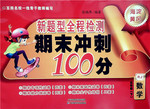题目内容
On the way the mountain village, we found the local houses different from ours.
| A.to | B.by | C.at | D.on |
A
解析试题分析:to到,向;by通过某种方式;at在一点;on在一面。句意:在去这个小山村的路上,我们发现当地的房子与我们的不同。结合语境可知选A。on one’s way to在去……的路上。
考点:介词辨析
点评:英语介词的一个特点是一词多义,并且介词间语义交叉现象很多,习惯用法也很多,有时很难从词义上区分开来。故学习中要注意不断总结,熟记一些介词和动词的固定搭配用法及习惯用法,是完成此类问题的捷径。

 新题型全程检测期末冲刺100分系列答案
新题型全程检测期末冲刺100分系列答案补全对话
( At the beginning of the trip to Mount Hood)
J=Jack L=Lynn S=Sue
J: OK, everybody. I’m very glad to lead the team. Are we all ready?
L: Wait! Has everyone put on sunscreen?
S: Oh, dear! ___1___
L: Here you are. Use mine. Put on some quickly. It can stop the sun from hurting your skin.
S: Thank you.
J: ___2__ especially because this is Sue and Lynn's first time to have such a trip.
L: All right, Jack.
J: Rule number one, don't walk by yourself. We don't all have to stay together, but don't go somewhere by yourself.
S: No problem. ___3____
J: OK. And rule number two, keep the mountain beautiful. ___4_ Don't litter around. We want others to be able to enjoy this beautiful place, too.
L: I know what you mean. ___5____.
J: Well, those are the two most important rules. If I think of anything else, I'll tell you on the way. So let's go!
All: Yeah! All right! Let's go!
|
A.Don't pick the flowers. |
|
B.We all know we are a team. |
|
C.I've put on some. |
|
D.I forget. |
E. And I have to give you a couple of rules before we start,
F. It also makes me sad when I see people have littered all over.